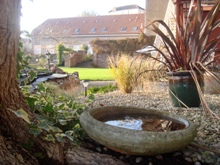| |
|
 |
Christian Eco Retreat Newsletters
 |
 |
 |
A view of the gardens at Emmaus House, Bristol |
In Autumn 2008 ARC contacted 200 faithbased Retreat Centres in the UK, to ask if they would like to form an informal network to discuss ecological issues through a regular newsletter. The response was encouraging. Many centres are going along similar paths and facing similar issues, but there has never before been a network enabling them to learn from each other’s creative ideas about how to tread more softly on the earth.
The quarterly e-mail bulletins contained inspiring stories from retreats throughout the UK showing how, whether big or small, there are always many ways to address our carbon footprint while also promoting the spiritual importance of caring for creation.
Pressure on ARC's resources meant that, unfortunately, the bulletin took a break after Summer 2011. A round robin e-mail in early 2013, however, confirmed that there was still an interest in green matters around the retreat centre network so the bulletin was revived and a new edition circulated at Easter.
If you would like to receive future editions of the Christian Eco-Retreat Newsletter just let us know through our on-line contact page here.
Archive of Eco Retreat Newsletters December 2013 News of a range of approaches to find more sustainable energy sources including hydro-electricity, wood-burning and biomass. And one vegetarian retreat that keeps a small flock of rescued sheep!
May 2013 Re-introducing the newsletter with a bumper crop of interesting developments including Minsteracres massive investment in a biomass boiler system, solar hot water and power generation helping costs and efficiency at Sheldon and the obvious benefits of a major insulation programme for a snowbound Dyffryn Farm.
 |
 |
 |
A healthy crop from the Minsteracres Peace Garden |
June 2011 In this edition, we share some news of an award for Holland House, a BBC documentary about HRH The Duke of Edinburgh, forthcoming summer workshops at Buckfast Abbey, and eco guidelines.
April 2011 Includes information on an exciting nomination for Holland House near Pershore in Worcestershire; news from Ministeracres, Northumberland including their plans for bio-mass installation and the offer of a contemplative prayer day for young people at Glenfall House, Gloucester.
December 2010 With news and photographs of a wonderful new eco-house built by Othona Bradwell this year, and tips for any other retreat centre wanting to do the same. Also news from Holland House and Emmaus House in Bristol.
July 2010 Contains news of Hayes Christian Conference Centre creating an ethical food policy; A new website for Hilfield Friary – and a short video; Emmaus House Bristol showing children how to love Creation and Sarum College celebrating 150 years.
March 2010 News of how ARC's Generational Change Plan has encouraged Holland House to live in harmony with creation; St Bueno's - where the Jesuit Priest and poet, Gerard Manley Hopkins, found inspiration; and exciting workshops focussing on ecology and the environment offered by Emmaus House.
September 2009 Includes news about composting and a Faith in Water Workshop at Sarum College; fruit and vegetable bonanza and wildlife at Whitchester.
March 2009 Featuring news from Emmaus House and Lee Abbey.
January 2009 With a story about Mill House Retreat's Reed Bed Grey Water System.
November 2008 The Carbon Trust re-thinks its policy on loans for faith retreats, and news of Ministeracres in County Durham.
Key Areas where Faith Retreat Centres can act environmentally1. Buildings and Infrastructure
Many retreat centres are looking at how to reduce the
carbon footprint of their buildings, through solar, wind,
geothermal, biomass boilers and other alternatives. The
choices, implications and costs can be daunting, and
the network has already been helpful in getting people
to compare information. Lee Abbey, in the Exmoor
National Park, is installing a new hydro-electric plant
which will be a model for many of its neighbouring
businesses in the Park. In 2007 Mill House in Devon
installed a reed bed system to help it process grey water
outfl ow from baths, showers and the kitchen sink. It
cost around £10,000, but Mill House believes it will pay
for itself in less than ten years, while decreasing the use
of damaging chemical processes.
2. Education
At their General Assembly in 2006, the La Retraite
Sisters chose “to encourage greater respect for the earth
and a commitment to the sharing of its resources”. One
of the educational programmes of their urban Bristol
retreat centre, Emmaus House involved inviting 10-year-olds from a local primary school to celebrate Creation
for a day, along the retreat centre model. They started
in the Meditation Room “because kids love silence” and
then explored the five different gardens. Each child was
invited to bring something from the garden into the
house. At the end of the day, the children prayed and
several, unprompted, gave thanks for their stone or
flower or snail, which they themselves had named.
3. Pastoral Care
People often go to faith centres when they are at their
most vulnerable, or at least most open to change in their
lives. Sometimes it is working in the gardens or in the
kitchens that can be life-changing, as at Minsteracres in
County Durham, where refugees and people with learning
diffi culties come from Newcastle to develop fruit and
vegetable gardens; sometimes centres simply offer the
chance to think, undisturbed, about life and the wonder of
creation. As a result of the newsletters some centres have
increased their meditation materials about nature and
the environment, and are promoting their green ideas on
their website and in their buildings.
4. Simpler Living
Many retreat centres raise chickens and pigs, and have
kitchen gardens to grow much of their food. The Soil
Association’s 70-50-30 guidelines, that food should be 70
percent fresh, 50 percent local and 30 percent organic,
have been useful. The issue that many centres realise
they are facing is over-supplying: providing guests with
too much meat, which is often wasted. Three years ago
a guest asked the Methodist International Centre (MIC)
in London whether their eggs were free-range. The
immediate answer was “no”, that it was too expensive. But
the question came before the MIC Board, which decided
that kindness in sourcing should be part of its ethos.
5. Media and Advocacy
Many centres have been models of environmental care for
years, but have not been telling anyone about it. We hope,
through this initiative, to help such centres think through
how they can use their own networks. This leafl et, for
example, happened because Morley House in Derbyshire
said they wanted to advertise the newsletter more widely.
5. Networks and Partnerships
In its first month, the newsletter reversed the Carbon
Trust’s policy to exclude small religious-run organisations
from the list of groups qualifi ed to apply for zero interest
loans. There will, no doubt, be many other benefi ts to this
informal network: if you’re not on it already, please write
to info@arcworld.org to join the list.
6. Celebrations
Holland House, in Gloucestershire, is so inspired by the
ideas the network is generating, that it is hoping to hold a
food festival to enjoy the local foods - asparagus and plums
for example - grown in the fertile Evesham Vale, and to
celebrate the sacred elements of this right relationship
with Creation.
LinksMore details about the Eco Retreat Centres involved in the UN-ARC 7YP.
Leaflet on the Eco-Retreat Initiative. .
|
 |
 |
|
|
|
|
|
 |
June 3, 2009:
The Planet's largest civil society movement for change
"During a recent visit to China, I participated in what will surely be one of the most memorable moments of my career: Daoist masters gathered to agree on a 7 year plan for climate change action. The overall strength and sustainability of religions was immediately apparent to me. " The Assistant SG of UNDP writes a persuasive argument for religions to be involved in environment negotiations |
 |
Last updated: September 24, 2009 :
Latest news on the Long Term Commitments
A sample of some of the faith groups around the world that are creating Five, Seven, Eight and Nine Year Plans to protect the natural environment, through the UNDP-ARC framework. |
 |
ARC's Diary
|
 |
 |
|
|

